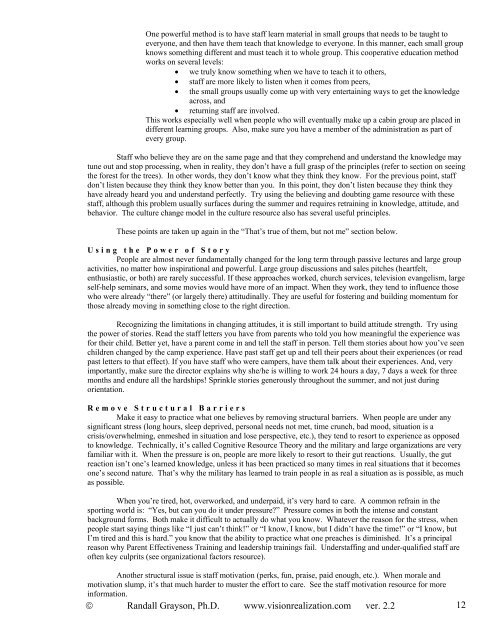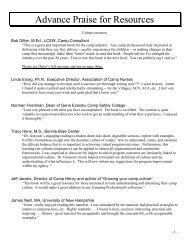Taking Camp Staff Training From Good To Best ... - Vision Realization
Taking Camp Staff Training From Good To Best ... - Vision Realization
Taking Camp Staff Training From Good To Best ... - Vision Realization
You also want an ePaper? Increase the reach of your titles
YUMPU automatically turns print PDFs into web optimized ePapers that Google loves.
One powerful method is to have staff learn material in small groups that needs to be taught to<br />
everyone, and then have them teach that knowledge to everyone. In this manner, each small group<br />
knows something different and must teach it to whole group. This cooperative education method<br />
works on several levels:<br />
• we truly know something when we have to teach it to others,<br />
• staff are more likely to listen when it comes from peers,<br />
• the small groups usually come up with very entertaining ways to get the knowledge<br />
across, and<br />
• returning staff are involved.<br />
This works especially well when people who will eventually make up a cabin group are placed in<br />
different learning groups. Also, make sure you have a member of the administration as part of<br />
every group.<br />
<strong>Staff</strong> who believe they are on the same page and that they comprehend and understand the knowledge may<br />
tune out and stop processing, when in reality, they don’t have a full grasp of the principles (refer to section on seeing<br />
the forest for the trees). In other words, they don’t know what they think they know. For the previous point, staff<br />
don’t listen because they think they know better than you. In this point, they don’t listen because they think they<br />
have already heard you and understand perfectly. Try using the believing and doubting game resource with these<br />
staff, although this problem usually surfaces during the summer and requires retraining in knowledge, attitude, and<br />
behavior. The culture change model in the culture resource also has several useful principles.<br />
These points are taken up again in the “That’s true of them, but not me” section below.<br />
Using the Power of Story<br />
People are almost never fundamentally changed for the long term through passive lectures and large group<br />
activities, no matter how inspirational and powerful. Large group discussions and sales pitches (heartfelt,<br />
enthusiastic, or both) are rarely successful. If these approaches worked, church services, television evangelism, large<br />
self-help seminars, and some movies would have more of an impact. When they work, they tend to influence those<br />
who were already “there” (or largely there) attitudinally. They are useful for fostering and building momentum for<br />
those already moving in something close to the right direction.<br />
Recognizing the limitations in changing attitudes, it is still important to build attitude strength. Try using<br />
the power of stories. Read the staff letters you have from parents who told you how meaningful the experience was<br />
for their child. Better yet, have a parent come in and tell the staff in person. Tell them stories about how you’ve seen<br />
children changed by the camp experience. Have past staff get up and tell their peers about their experiences (or read<br />
past letters to that effect). If you have staff who were campers, have them talk about their experiences. And, very<br />
importantly, make sure the director explains why she/he is willing to work 24 hours a day, 7 days a week for three<br />
months and endure all the hardships! Sprinkle stories generously throughout the summer, and not just during<br />
orientation.<br />
Remove Structural Barriers<br />
Make it easy to practice what one believes by removing structural barriers. When people are under any<br />
significant stress (long hours, sleep deprived, personal needs not met, time crunch, bad mood, situation is a<br />
crisis/overwhelming, enmeshed in situation and lose perspective, etc.), they tend to resort to experience as opposed<br />
to knowledge. Technically, it’s called Cognitive Resource Theory and the military and large organizations are very<br />
familiar with it. When the pressure is on, people are more likely to resort to their gut reactions. Usually, the gut<br />
reaction isn’t one’s learned knowledge, unless it has been practiced so many times in real situations that it becomes<br />
one’s second nature. That’s why the military has learned to train people in as real a situation as is possible, as much<br />
as possible.<br />
When you’re tired, hot, overworked, and underpaid, it’s very hard to care. A common refrain in the<br />
sporting world is: “Yes, but can you do it under pressure?” Pressure comes in both the intense and constant<br />
background forms. Both make it difficult to actually do what you know. Whatever the reason for the stress, when<br />
people start saying things like “I just can’t think!” or “I know, I know, but I didn’t have the time!” or “I know, but<br />
I’m tired and this is hard.” you know that the ability to practice what one preaches is diminished. It’s a principal<br />
reason why Parent Effectiveness <strong>Training</strong> and leadership trainings fail. Understaffing and under-qualified staff are<br />
often key culprits (see organizational factors resource).<br />
Another structural issue is staff motivation (perks, fun, praise, paid enough, etc.). When morale and<br />
motivation slump, it’s that much harder to muster the effort to care. See the staff motivation resource for more<br />
information.<br />
© Randall Grayson, Ph.D. www.visionrealization.com ver. 2.2 12





